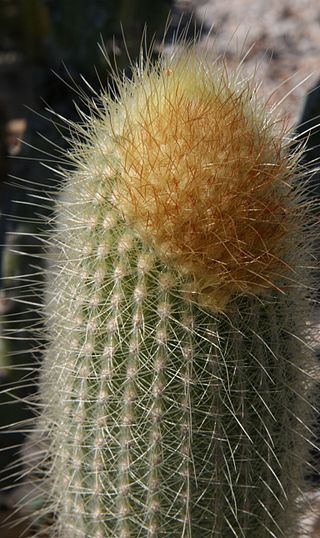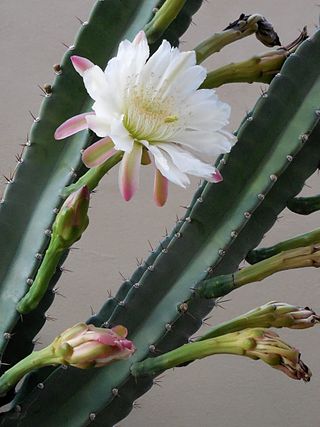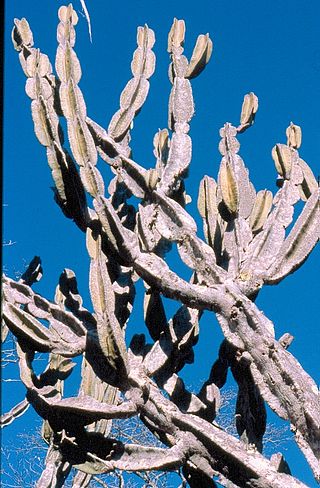
Stetsonia coryne, the toothpick cactus, is the sole species in the cactus genus Stetsonia. Stetsonia coryne grows to a height of 15 to 25 ft tall. It has white flowers.

Arthrocereus glaziovii is a species of plant in the family Cactaceae. It is endemic to Brazil. Its natural habitat is rocky areas. It is threatened by habitat loss.

Arthrocereus melanurus is a species of plant in the family Cactaceae. It is endemic to Brazil. Its natural habitats are dry savanna and rocky areas. It is threatened largely by habitat loss.

Micranthocereus streckeri is a species of plant in the family Cactaceae. It is endemic to Brazil. Its natural habitats are subtropical or tropical moist shrubland and rocky areas. It is threatened by habitat loss.

Strophocactus brasiliensis, synonym Pseudoacanthocereus brasiliensis, is a species of plant in the family Cactaceae. It is endemic to Brazil. Its natural habitats are subtropical or tropical dry forests and hot deserts. It is threatened by habitat loss.

Cereus ( "serious") is a genus of cacti including around 33 species of large columnar cacti from South America. The name is derived from Greek (κηρός) and Latin words meaning "wax", "torch" or "candle". Cereus was one of the first cactus genera to be described; the circumscription varies depending on the authority. The term "cereus" is also sometimes used for a ceroid cactus, any cactus with a very elongated body, including columnar growth cacti and epiphytic cacti.

Cereus hildmannianus is a species of cactus from southern South America. Its distribution is uncertain but probably includes Brazil, Paraguay, Uruguay and Argentina.

Cereus jamacaru, known as mandacaru or cardeiro, is a cactus native to central and eastern Brazil. It often grows up to 6 metres high.

Echinocereus pentalophus, with the common name ladyfinger cactus, is a species of Echinocereus cactus, in the tribe Echinocereeae Tribe. It is native to North America.

Cereus aethiops is a species of cactus found from Uruguay to Argentina.

Praecereus saxicola is a flowering plant in the family Cactaceae that is found in Bolivia, Argentina and Paraguay

Cereus phatnospermus, synonym Cereus kroenleinii, is a species of columnar cactus found in Brazil, Bolivia, and Paraguay.

Cereus pierre-braunianus is a species of columnar cactus found in NE Goiás in Brazil.

Cereus lanosus or is a species of columnar cactus found in Central, Cordillera, Concepción, and Paraguarí departments of Paraguay. The plant is found growing in rocky hills at elevations of 250 and 300 meters.

Mirabella estevesii, synonym Cereus estevesii, is a species of columnar cactus found in Minas Gerais, Brazil. The first description was published in 2004 by Pierre Josef Braun as Cereus estevesii.

Echinocereus scheeri is a species of hedgehog cactus in the family Cactaceae, native to northern Mexico. With its dramatic offsets, it has gained the Royal Horticultural Society's Award of Garden Merit.

Mirabella albicaulis, synonym Cereus albicaulis, is a species of flowering plant in the family Cactaceae, native to Northeast and Southeast Brazil. It was first described by Britton and Rose in 1920 as Acanthocereus albicaulis.

Xiquexique gounellei is a species of plant in the genus Xiquexique of the cactus family. Common names include "Alastrado", "Chique-Chique", "Xique-Xique" and "Xique-Xique das Pedras".

Cereus fernambucensis is a species of Cereus found in Brazil.

Cipocereus crassisepalus is a species of cactus endemic to the state of Minas Gerais in Brazil.





















